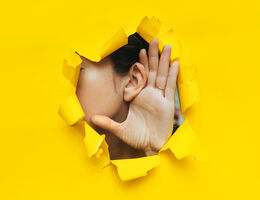
March 31, 2025—Noise is a part of everyday life. And although you may not enjoy the sound of airplanes soaring, traffic rumbling or music thumping, you also may not give these noises much thought.
However, health experts say that noisy environments can be considered noise pollution. And, like other kinds of pollution, noise can be detrimental to your health.
The problem with noise
For instance, the American Speech-Language-Hearing Association says that noise pollution can cause:
- A higher heart rate.
- High blood pressure.
- Poor sleep.
- Upset stomach.
- Difficulty in learning.
- Chronic stress.
What's more, the American Heart Association reports that in one large, 20-year study of Danish women, prolonged exposure to both noise and air pollution increased the risk of heart disease.
And according to the American College of Cardiology, a 2022 study found that the heart attack rates in New Jersey were 72% higher in places with high levels of transportation noise. The researchers estimated that noise was to blame for 5% of heart-attack hospitalizations in the state.
How much noise is too much? It depends. For example, even quiet noises—like a dripping faucet—can affect sleep. When it comes to your hearing, any noise over 85 decibels can be harmful if you're exposed to the noise long or often enough, according to the National Institutes of Health. Noise that registers above 140 decibels can damage your hearing immediately.
Here are decibel ratings for some common noises:
- 60 to70 decibels: Normal conversation, vacuum cleaner, dishwasher.
- 91 decibels: Motorcycle, lawn mower, subway.
- 94 to 112 decibels: Hair dryer, tractor, chainsaw, rock concert.
- 120 to 130 decibels: Sirens, plane taking off, jackhammer.
- 140 to 150 decibels: Fireworks within 3 feet, firearms.
How to cut down on noise
There isn't a lot you can do about fireworks, planes or loud motorcycles. But you can take several steps to reduce the amount of noise pollution you're exposed to.
- Muffle sound. In your bedroom, hang thick curtains over the windows. Other soft surfaces, such as rugs, may soften noises too.
- Insulate your windows. Soundproof windows are great, but finding and sealing insulation gaps will also help.
- Use sound to your advantage. A machine or mobile app that emits white noise may help you sleep better, as can a fan or soothing nature sounds, like ocean waves, played at a low volume.
- Dial it down. If you're listening to music or watching TV, keep the volume to around 75 decibels or lower. Your mobile device may have a built-in decibel meter. Free, noise-measuring mobile apps are available too.
- Plug your ears. Earplugs and earmuffs are widely available and effective at reducing harmful noise levels. When a vehicle with a loud siren goes by, use your hands to block your ears.
Hold on to your hearing
Noise-induced hearing loss can start early—and it can't be reversed. But it's never too late to start protecting your hearing.
Sources
- American College of Cardiology. "Living Near Noise Pollution Tied to Greater Risk of Heart Attack." https://www.acc.org/About-ACC/Press-Releases/2022/03/22/19/59/Living-Near-Noise-Pollution-Tied-to-Greater-Risk-of-Heart-Attack.
- American Heart Association. "Air Pollution, Traffic Noise May Raise Heart Failure Risk in Women." https://www.heart.org/en/news/2021/10/06/air-pollution-traffic-noise-may-raise-heart-failure-risk-in-women.
- American Psychological Association. "Speaking of Psychology: How Noise Pollution Harms Our Health, With Arline Bronzaft, PhD." https://www.apa.org/news/podcasts/speaking-of-psychology/noise-pollution.
- American Speech-Language-Hearing Association. "Loud Noise Dangers." https://www.asha.org/public/hearing/loud-noise-dangers/.
- National Institutes of Health. "Noise-Induced Hearing Loss." https://www.nidcd.nih.gov/health/noise-induced-hearing-loss.
- Sleep Foundation. "How Noise Can Affect Your Sleep Satisfaction." https://www.sleepfoundation.org/noise-and-sleep.
- United States Environmental Protection Agency. "Clean Air Act Title IV – Noise Pollution." https://www.epa.gov/clean-air-act-overview/clean-air-act-title-iv-noise-pollution.